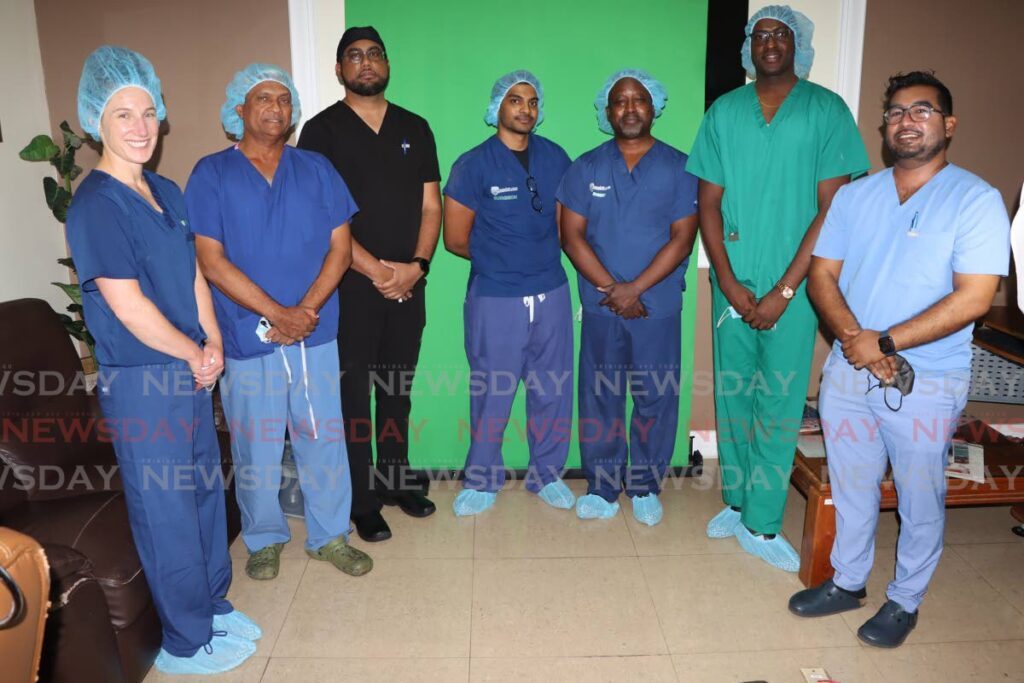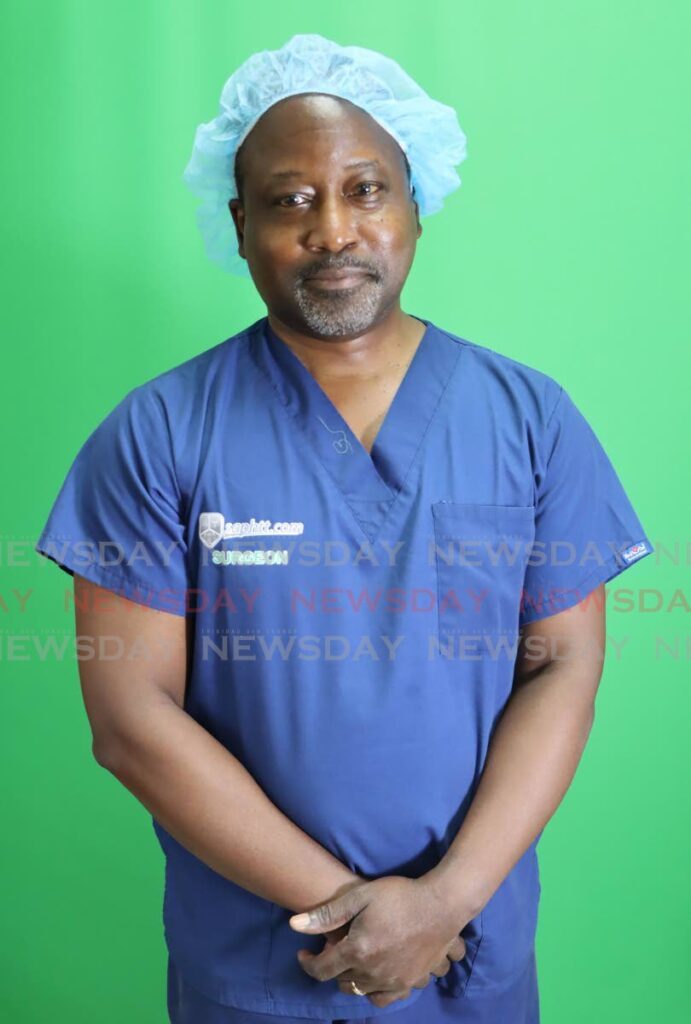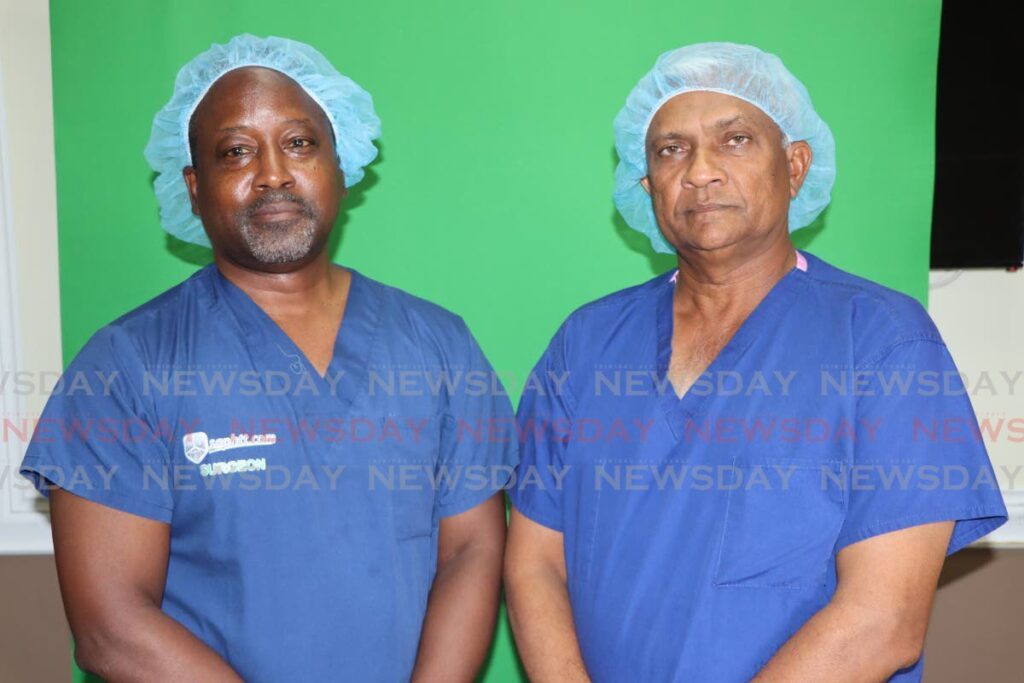Cochlear implant surgery available in Trinidad and Tobago

While cochlear implants have been done in different parts of the Caribbean in small numbers, they are now available in Trinidad and Tobago.
Cochlear implants have been around since the 1950s in a very basic form.
A cochlear implant is an electronic device that can help people with severe hearing loss from inner-ear damage for whom hearing aids are not helpful. Hearing aids amplify sound, but cochlear implants bypass the damaged organs in the ear to deliver sound directly to the auditory nerve.
Prof Howard Francis, a specialist in otolaryngology (ear, nose and throat) at Duke University in the US, and Dr Solaiman Juman, ENT consultant at the Eric Williams Medical Sciences Centre, have collaborated with the St Augustine Private Hospital to do cochlear implants.
Earlier this year, the team did its sixth and seventh implants, the latest for a teenage patient.
Immediately after that surgery, the two surgeons and their team sat with Newsday to chronicle their journey.
Francis said, "I have had the privilege over the last several years to be asked by Dr Juman to help him in developing a programme that serves the people of TT in managing severe to profound hearing loss in all age groups.
"Today we would have done our sixth and seventh cochlear implant since we started collaborating several years ago."
His role as a consultant, he explained, is "to develop the skill set here in TT – a surgical skill set, but also a multi-disciplined team skill set, which is really critical in achieving success, especially in the very young."

He said he has worked with an audiologist, speech and language pathologists and paediatricians to develop "a comprehensive programme that is small but growing and is amongst the most capable in the Caribbean." The procedure is now standard in the US, Europe, Australia and other countries for the management of severe to profound sensorineural hearing loss. That is, he said: "Hearing loss that would not be addressed with hearing aids alone, because the quality of that (sound) is so poor and so broken that a young child would not have the ability to use that broken signal to learn how to listen and speak. Such a child would function in other ways.
"(But) if a family is interested in giving that child the ability to listen and attend schools where communication is verbal rather than sign, then a cochlear implant gives them the best opportunity." He warned that the results of the implant are much more likely to succeed if the intervention is done very early in life – preferably by the time the patient is two.
"For that to happen, it requires that we have better screening of newborns, because you want to identify these kids well before they are six months of age. Get them started with hearing aids and therapy and have an implant ideally before a year of age, and certainly try to get it done before two years of age.
"Later is possible, but the quality of that listening experience and ability to communicate drops off very quickly and significantly the longer you wait to provide intervention."
Juman agreed that in TT there are many hearing-impaired people who need this help. He said, "We implant an electrical device into the cochlea (a cavity in the inner ear) to stimulate the nerve for hearing.
"Internationally, this has brought great results for both adults and children who have lost their hearing. We are using high-tech devices to assess the hearing, along with MRI and CT scanning."
Francis, he said, has been using his expertise not only to do cochlear implant surgery himself, but also to transfer the knowledge so that local doctors will also be able to do the procedure here.
"Today," he said, "we have a case of a young man who lost his hearing at birth and we inserted a cochlear implant and it went very smoothly."
But he added, "Even after the operation a lot of work still has to be done by the parents to help the rehabilitation process."
Juman also praised audiologist Dr Deborah Pinder. Audiologists diagnose, assess and manage disorders involving hearing loss, tinnitus (sounds in the ear with no external source),balance and related systems.
"Dr Pinder has been a stalwart in trying to detect children with hearing loss early in their life and those that need the service of a cochlear implant."
The percentage of patients that have severe to profound sensorineural hearing loss is small, he said, but a significant number need intervention.
"Over the past few years we had a training programme and we have about seven graduates. One or two of those would do fellowships in the US and the UK, where they would get experience in audiology and cochlear implantation, and our vision is that they would return with those skills, so we can have in-house skills to do the procedure."
However, funding for their training and the implants is an issue.
He hopes that governments and the Ministry of Health will understand that: "The earlier we intervene in a child that has hearing loss, we would have a better chance of bringing that child into mainstream society, a child who would bring benefit to the country, as opposed to...being dependent on facilities."

Factors in success rate
Francis explained: "In an adult who already knows how to speak (but) has lost their hearing, and you provide them with a cochlear implant, the chances are very high that they would be able to use that device to understand speech. There is at least a 70 per cent chance that they would receive most of their hearing.
"In certain circumstances they may still need to read lips, especially if there is background noise interfering with their communication.
There are different levels of success and determining factors, he said. These include:
Can the person hear at all? There is almost a 100 per cent chance that they will hear (after the surgery).
Can they understand what they are hearing? That's where (full hearing) starts to drop a little bit. This is the 70 per cent-plus range.
In children: Can they use what they hear to be able to speak, listen and understand? Age of detection and intensity of therapy play an important role over the first year.
One implant or two?
Will every patient would need two implants, one for each ear, for hearing to be at its best?
Francis said: "Ideally both ears working together provide help to the brain, to use information from both directions to pick up signals in a noisy environment.
"In a quiet environment, one side working is fine. As you start to have more competing noise, it becomes more useful to have both ears.
"However, that can be a pretty significant cost. Like everything in life, risk benefit and cost benefit – we have to make that decision.
"For most of my career, adults and kids were getting only one implant and they did fine. I'd say that with a second one, there is a steeper learning curve."
Deciding who needs cochlear implants
"Since a deaf child may behave very normally, it takes a very specific set of people to identify the child with the hearing issue. All those pieces are important in having a successful cochlear implant eventually. Most of the team is non-surgical: you just need one surgeon.
"The dream...now is that TT can become a destination for this kind of operation because of the kind of expertise in our group."

Comments
"Cochlear implant surgery available in Trinidad and Tobago"